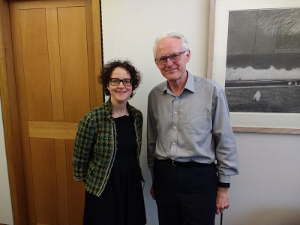News
MP invites academic to provide expertise on energy drinks and young people

A Fuse academic has visited Westminster to outline the evidence behind a call for age restrictions on the sale of energy drinks to young people.
Dr Amelia Lake, Fuse Associate Director, dietitian and Reader in Public Health Nutrition at Teesside University, was invited to London to meet MP Norman Lamb, Chair of the Science and Technology Select Committee, which ensures that government policy and decision-making is based on good scientific advice and evidence.
Earlier this year Dr Lake and colleagues from Fuse (the Centre for Translational Research in Public Health) called on the government to consider restricting the sale of the drinks to under-16s after research revealed that they were being sold to children ‘cheaper than water and pop’.
The study also highlighted the dangers of energy drinks, which typically contain high levels of caffeine and sugar, with evidence indicating that regular or heavy use by under-18s is likely to be detrimental to health.
The research received national media coverage and Norman Lamb and Dr Lake appeared as guests on the same BBC Radio 5 Live Investigates programme about Children and Energy Drinks.
Dr Lake has also supported a national campaign, fronted by celebrity chef Jamie Oliver, which has been backed by parents, academics and teachers, and UK supermarket chains Waitrose, Sainsbury's, Aldi, Asda, Morrisons, Lidl and Tesco have now agreed to ban the sale of energy drinks to children.
More about the Fuse research study
The academics from Fuse based Durham, Newcastle, Northumbria and Teesside Universities spoke to children and young people, aged 10-14 years old, from primary and secondary schools in the North East and visited shops in the local area. This was the first study to explore in-depth the views of children, as young as 10-years-old, on energy drinks.
The research, published in the journal PLOS ONE, revealed that energy drinks were:
- Easily available to the children and young people in local shops
- Sold for as little as 25p (single cans are often on promotion, for example four for £1)
- Targeted at children online in pop-up adverts, on television, in computer games for over-18s, and through sports sponsorship
- Linked to extreme sports, gaming, sexuality and gender, and use of sexualised imagery.
Research has revealed that around one in three young people say that they regularly consume energy drinks. On average, young people in the UK consume more energy drinks than those in other European countries. A single can of popular brands on the market can contain around 160mg of caffeine, while the European Food Safety Authority recommends an intake of no more than 105mg caffeine per day for an average 11-year-old.
Related content
The truth about what downing energy drinks really does to kids - New Scientist
Last modified: Tue, 31 Jul 2018 09:13:57 BST





